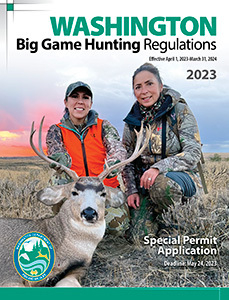Mandatory Hunter Reporting
Hunting Activity Reporting
By January 31, midnight, hunters must report their hunting activity for EACH special permit acquired AND each deer, elk, bear, moose, bighorn sheep, mountain goat, and turkey tag purchased in 2023 even if you did not hunt. You are required to report hunting activity for cougar, please see requirements on the Cougar General Season Page. For each transport tag you will owe a general season hunting activity report AND you will also owe a hunting activity report for EACH big game special permit awarded. The special hunt permit reports should be completed at the end of the special permit season. You must complete ALL reports to avoid the $10 penalty. Hunters who do not meet the deadline must pay a $10 penalty before they can buy a license the following year. If your hunting season (including special permits) extends beyond January 31, your hunter report is due within 10 days of the close of that season or on March 31st, which ever date occurs first. You will receive a confirmation number for each successfully submitted hunter report. Be sure to keep all of your confirmation numbers. Do not send in your tags or licenses to WDFW, as they do not fulfill the reporting requirement. You are not required to report cougar transport tags unless you harvest a cougar (see hide sealing requirements on Cougar General Seasons).
Incentive Permit Drawing for Early Reporting
Hunters who report harvest by January 10 will be entered into a drawing for a special incentive permit. The nine special permits include two any elk permits for western Washington, two any elk permits for eastern Washington, and five statewide any deer permits. If your special permit hunting season extends beyond January 31, you will be included in the incentive drawing if you make a report within 10 days of the close of that season. The incentive drawing is usually held in April.
Incentive Permit Season
Incentive permits are valid for areas open to general hunting seasons or special permit hunting seasons. The hunt dates are September 1 through December 31. The permits require a hunter to use archery equipment during archery season, muzzleloader equipment during muzzleloader season, and any legal weapon at other times if there are no firearm restrictions.
Paying for Incentive Permits
Hunters who win the special incentive permit must send the appropriate license fee to the Washington Department of Fish and Wildlife Headquarters office in Olympia. WDFW will mail the license and transport tag to the permit winners.
Reports Required
Hunter reports are required from Deer, Elk, Black Bear, Moose, Bighorn Sheep, Mountain Goat, and Turkey Hunters.
Reports Due By:
January 31, 2024
Two Ways to Report:
Call 360-902-2464, M-F, 8:30 a.m. to 4:45 p.m.; Hunter harvest reports will be taken 24/7 during the month of January ONLY through an after-hours call center.
Online:
Note: Reports are not accepted by mail or Email.
* EARLY SEASON cougar hunters should report their cougar hunt activity along with any other big game species via the WILD system by January 31, 2024. LATE SEASON cougar hunters should report their cougar hunting activity (separately from the early season) via the WILD system and report by March 31, 2024.

